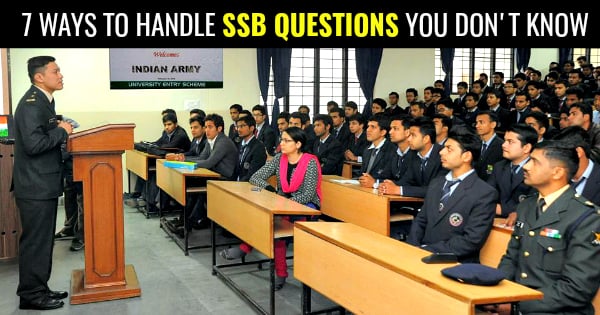The thought of not being able to answer an interview question is a scary one for many of us. It happens more often than we might think. Sometimes, we simply don’t know the answer and the silence can seem excruciating. In other cases, we may know, but our brains freeze. Whatever the case is, being in that moment, we wish the floor would open up and swallow us whole.
Being prepared for not being able to respond can help mitigate some of the anxiety, and help you make the most out of a difficult situation. Keep these tips in mind the next time you’re strapped for an answer.
- Don’t panic: Your mindset going into an SSB interview is one of the critical ingredients for success. Many candidates assume that they must have a near perfect personal interview in order to land the job. In reality, it helps to recognize that other candidates will also have difficulty answering all the questions to the complete satisfaction of the IO. Often a solid but imperfect interview will be sufficient to move you on in the evaluation process. This realization can help stop you from panicking if you can’t answer a question well. Do take the time to analyze the most common interview questions asked so you will have an idea of what to expect.
- Stay Calm: Your reaction, if you can’t immediately come up with an answer, can be more important than the ability to deliver the answer. Maintaining a calm, confident posture when confronted with a tough question will help convince the IO that your inability to answer a question is an unusual occurrence for you. If you fall apart and get upset, the IO may lose confidence in you. Consider saying something like “Sorry Sir, I don’t know the answer but I will go back and find it out and let you know during the conference.” or “I’m not entirely sure of an answer, but given my limited understanding of the topic, here are a few thoughts.” Never say, “I don’t know” just right off the bat. Take some 3-5 secs to think and if you can’t come up with anything then say it. Also, don’t try to make stuff up because the IO can see right through that.
- Tell IO what you do know: Like said earlier, if you are not sure of the answer, express some of your thoughts. If you do have some knowledge of that question, then take the time to tell IO what you do know of the situation. Saying everything out loud can start you on the process of figuring out the problem.
- Tell IO how you would find the answer: Even if you don’t know what the answer is, you can tell the interviewing officer the steps you would take to figure out the problem. IOs ask you hard questions because they want to see what your thought process is. Sometimes, the thought process may be more important than the actual answer. They want to see that you can take initiative and have the resources to come up with a solution on your own, instead of needing someone to hold your hand through problems. While you’re trying to find the solution, you can admit to not knowing certain parts; this way, you come off as being honest, and he will know you are not trying to fake it. For example, if you need to calculate something and you are not good at maths, you can respond with “I can’t-do the calculations off the top of my head, but I think these calculations will give me the answer. And what I can do is use a calculator to find that answer.” Showing a little honesty shows vulnerability and transparency. It also makes you more amiable.
- Buy some time: You can often buy some time to formulate an answer by rephrasing the question or asking for clarification. For example, you might say “Sir, are you looking for an example of how I organized a team event at college?” By the time the IO answers something may have come to mind!
- Ask Questions: Maybe it’s the question you don’t understand. Ask IO to clarify what he said. Go deeper into the question to see if you can get more details that will help you figure it out.
- Answer back during the conference if asked: Perhaps the most significant thing you could do if you have been totally stumped by a key question is to research a strong answer after the personal interview. You can then include that answer during your conference.

Take the interview easy. It’s not much of a task. You can easily pull it off if you have the right attitude to deal with it. Don’t prolong moments and make it awkward for both the IO and yourself. Practice interviewing at home with family and friends, that will boost your confidence.













